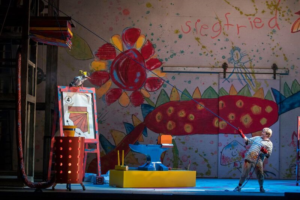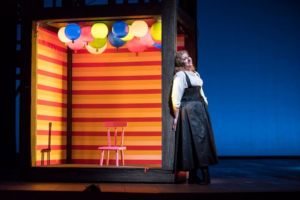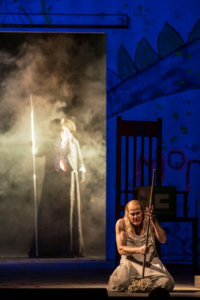
 [rating=5] Our hero enters dejectedly dragging the tail of the dragon behind him. Though he wears the Ring of Power on his pinky and his father’s reforged magic sword slung over his shoulder, he has failed to comprehend fear and remains without a friend in the world. Director David Pountney supplied us with this image in Siegfried, part III of the Lyric’s original production of Richard Wagner’s Ring Cycle. The most amusing of the tetralogy, Siegfried provides Pountney and his cast, including several Lyric debuts, with opportunities for adventure, humor, and whimsy, as well as drama and dazzling set pieces. Conductor Sir Andrew Davis and the Lyric’s orchestra continue their loving and passionate rendition of Wagner’s complex weaving of leitmotifs, but tenors Burkhard Firtz as Siegfried and Matthias Klink as Mime provide this production’s most distinctive charm.
[rating=5] Our hero enters dejectedly dragging the tail of the dragon behind him. Though he wears the Ring of Power on his pinky and his father’s reforged magic sword slung over his shoulder, he has failed to comprehend fear and remains without a friend in the world. Director David Pountney supplied us with this image in Siegfried, part III of the Lyric’s original production of Richard Wagner’s Ring Cycle. The most amusing of the tetralogy, Siegfried provides Pountney and his cast, including several Lyric debuts, with opportunities for adventure, humor, and whimsy, as well as drama and dazzling set pieces. Conductor Sir Andrew Davis and the Lyric’s orchestra continue their loving and passionate rendition of Wagner’s complex weaving of leitmotifs, but tenors Burkhard Firtz as Siegfried and Matthias Klink as Mime provide this production’s most distinctive charm.
Mime has been reduced to a lone work station in his own house. At rise, the dwarven blacksmith is battering away on another toy sword Siegfried will inevitably break, cursing his inability to reforge the one sword the boy could use to slay the dragon Fafner (Patrick Guetti), allowing Mime to claim his horde of treasures. Set designers Johan Engels and Robert Innes Hopkins have made this very much Siegfried’s room: his drawings and plushy likenesses of Fafner abound, as do his tributes to his deceased mother and father. A teenager who acts like a six-year-old, Siegfried is quite the tyrant. Fritz plays him with a loping, child’s gait as he chases Mime into a playpen, waving a finger and berating him. Klink’s Mime loves channeling his resentment into martyrdom; he mournfully wails about all he has sacrificed for a child who hates him, but he responds to reasonable questions with tirades of verbal abuse. And although Mime whines that he is old and feeble, the blacksmith’s movements are strong and fluid, albeit off-putting. The same is true of his voice, which is clear and melodious, in contrast to his grotesque appearance. Indeed, Klink, a heldentenor in his own right, deserves commendation for making the comic relief villain such charismatic presence. Siegfried’s toxic relationship with the man who raised him to be a disposable weapon is rich grounds for exploration and remains taut right up until the end.
Pountney’s main concept is to view this production from Siegfried’s childish perspective. The famous sword-forging scene, which features of Wagner’s most dramatic music, emphasizes Siegfried’s exuberance. It’s very funny the way Pountney has it set up, and Davis’s conducting sounds like a reflection of Siegfried’s innocent self-confidence. Fritz strikes just the right balance between being charming and annoying. Siegfried is a little terror, but one feels proud of him when he discovers his own leitmotif while befriending the forest creatures right before his confrontation with the dragon. He may not exactly gain wisdom, but he does learn to do things for himself and others. Fritz’s voice is in top notch, but what’s amazing is that he sustains it during an athletic performance that requires him to commit to a lumbering movement style and endless fidgeting.
Returning to the Lyric’s stage is Eric Owens in the role of Wotan, wandering wizard and king of the gods. Back in his element after the events of Die Walküre, Owens’s Wotan is majestic and sinister. He strides on stilts (a good choice by costume designer Marie-Jeanne Lecca) into Mime’s home, an avenging presence that pauses to dotingly inspect his grandson’s toys. The scene in which he and Mime question each other is a remarkably tense exposition sequence and an excellent example of how to catch an audience up who hasn’t seen other parts of the Ring Cycle. But when he encounters the deposed dwarf ruler Alberich (the bold and seething Samuel Youn), Wotan is mischievous, and Owens’s voice light. Owens and Fritz also have the pleasure of interacting with Patrick Guetti’s Fafner, a truly unforgettable presence. Fafner’s mournful voice contrasts hilariously with his Audrey II-like inflatable design. Siegfried’s fight with him is a moment of great excitement, for which choreographer Denni Sayers, puppet adviser Brandon Kirkham, and Sir Andrew Davis also deserve a great deal of credit.
It takes a while for female presence to enter the opera. Diana Newman plays a delightful bird that provides Siegfried with help, but there aren’t extended scenes with women until Wotan conjures the chthonic goddess Erda  (Ronnita Miller, another Lyric debut) in Act III. Her voice is as clear as Wotan’s is dark, and her obvious compassion and sense briefly make even the great Wotan reconsider his course of action. Siegfried’s own emotional climax is with the ex-Valkyrie Brünnhilde (Christine Goerke reprising her starring role), and this is the only moment when the production lags. The conclusion is foregone, but Siegfried seems to literally not understand what her objections are or what his own intention is. Nonetheless, the production does recover, so that Siegfried and Brünnhilde’s final duet brings a fitting conclusion to a play full of high-stakes volleys between two actors. For newcomers, this production is surprisingly accessible for the third of a four-part series and it works well as a stand-alone story. (One unsung hero is Colin Ure, responsible for the projected English supertitles. They give the production a lot of its psychologically plausible feel.) People who are familiar with the Ring Cycle know that Siegfried is a chance for us to return to the human realm in between the heavy mythic tones of the other parts of the series, and this version is refreshing and engaging.
(Ronnita Miller, another Lyric debut) in Act III. Her voice is as clear as Wotan’s is dark, and her obvious compassion and sense briefly make even the great Wotan reconsider his course of action. Siegfried’s own emotional climax is with the ex-Valkyrie Brünnhilde (Christine Goerke reprising her starring role), and this is the only moment when the production lags. The conclusion is foregone, but Siegfried seems to literally not understand what her objections are or what his own intention is. Nonetheless, the production does recover, so that Siegfried and Brünnhilde’s final duet brings a fitting conclusion to a play full of high-stakes volleys between two actors. For newcomers, this production is surprisingly accessible for the third of a four-part series and it works well as a stand-alone story. (One unsung hero is Colin Ure, responsible for the projected English supertitles. They give the production a lot of its psychologically plausible feel.) People who are familiar with the Ring Cycle know that Siegfried is a chance for us to return to the human realm in between the heavy mythic tones of the other parts of the series, and this version is refreshing and engaging.
Siegfried will continue at the Civic Opera House, 20 N Upper Wacker Drive, Chicago, thru November 16, with the following showtimes:
November 11: 1:00 pm
November 16: 6:00 pm
Running time is five hours with two intermissions.
The Lyric offers parking deals with Poetry Garage at 201 W Madison St. if inquired about in advance. Tickets start at $119; to order, visit LyricOpera.org or call 321-827-5600.
To see what others are saying, visit www.theatreinchicago.com, go to Review Round-Up and click at “Siegfried.”







More Stories
“Prayer for the French Republic” reviewed by Julia W. Rath ( and another by Paul Lisnek)
“Obliteration” reviewed by Mark Reinecke
” A Jukebox for the Algonquin”